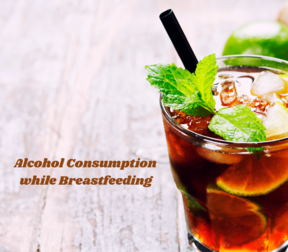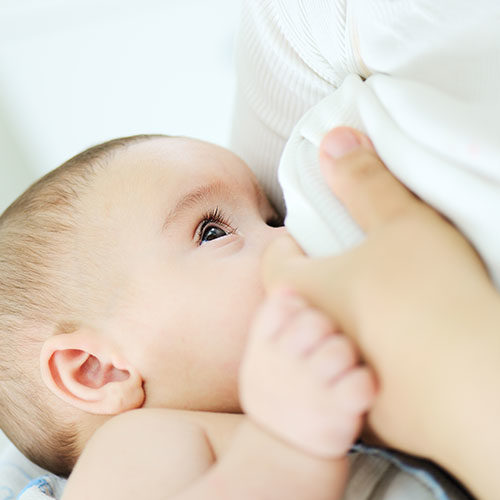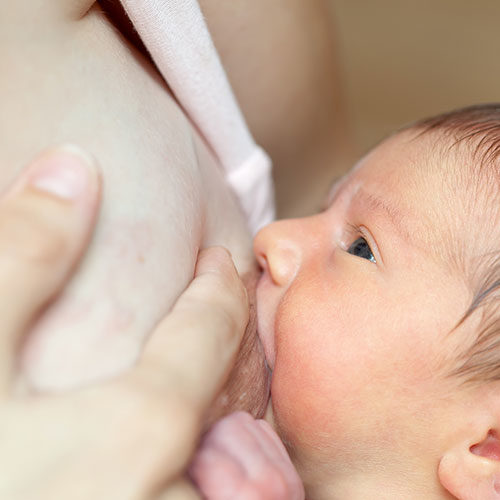Can I consume alcohol while breastfeeding?
Breastfeeding women are often given conflicting advice about consuming alcohol. While there is a strong recommendation against consuming alcohol
during pregnancy, there is still a lot of scope for research to be done on the effects of alcohol consumption by the mother on the baby while breastfeeding.
Long-term outcomes, in particular, are unknown.
Regular Heavy Drinking:
It is established that maternal alcohol abuse while breastfeeding and regular heavy drinking can cause many negative effects in the breastfeeding baby. “Chronic or heavy consumers of alcohol should not breastfeed” is the recommendation. When alcohol is consumed in large amounts, the negative effects seen in the baby are drowsiness, sleep disturbances, weakness, abnormal weight gain, failure to thrive, delayed motor development etc. Some of the negative effects related to breastfeeding on the mother are inhibition of let-down and decrease in milk volume.
Occasional Moderate Drinking :
Dr. Jack Newman, in his handout ‘More breastfeeding myths’ says the following.
“Reasonable alcohol intake should not be discouraged at all. As is the case with most drugs, very little alcohol comes out in the milk. The mother can take some alcohol and continue breastfeeding as she normally does. Prohibiting alcohol is another way we make life unnecessarily restrictive for nursing mothers.”
Alcohol is completely water and fat-soluble and therefore can freely travel from the bloodstream to breast milk (and back). Thus, what is most important to understand is that – The amount of alcohol in a breastfeeding woman’s breast milk is the same as the amount of alcohol in her bloodstream. Consequently, when the alcohol leaves the mother’s bloodstream, it is presumably gone from her breast milk as well. Thus, the simplest guideline is that: the consumption of alcohol should be minimized and a woman can breastfeed after a drink when she feels neurologically normal. Loosely translated as “Sober enough to drive, sober enough to nurse”.
However, it can be a little more complicated than that, as a lot of factors determine the effect of maternal alcohol consumption on her breastfeeding baby.
Factors determining the effect of mother’s alcohol consumption on her breastfeeding baby :
Drinking alcohol while breastfeeding is a personal choice. If a breastfeeding mother chooses to consume alcohol, there are certain points that need to be considered.
1. Baby’s Age –
Newborns have very immature livers that can be more affected by alcohol. A baby less than 3 months of age metabolizes alcohol at half the rate as an adult. Post 3 months, the rate gets better, however much less than an adult.
2. Mother’s size and weight –
A heavier person metabolizes alcohol faster than a lighter person. An average woman weighing approximately 60 kg will take 2-3 hours for the alcohol to leave her system after consuming one standard alcoholic drink. 4-6 hours for 2 standard alcoholic drinks and 6-8 hours for 3 standard alcoholic drinks.
3. Amount of alcohol consumed –
As mentioned in the point above, the more alcohol, the more time it takes for it to leave the system. Here, it is important to understand what is meant by 1 standard drink. One standard drink can mean different quantities for different kinds of drinks. Given below is an understanding of it with examples.
- 12 oz (360 ml) beer (typically 5% or less alcohol)
- 8-9 oz (240-270 ml) malt liquor (typically about 7% alcohol)
- 5 oz (150 ml) wine (typically about 12% alcohol)
- 1.5 oz (45 ml) liquor like whiskey, gin, rum, vodka, tequila (typically about 40% alcohol)
4. Food consumed along with alcohol –
When alcohol is consumed alone, it peaks in the bloodstream (and breast milk) after 30 to 60 minutes of starting the drink. Whereas, if alcohol is consumed along with food, it peaks between 60-90 minutes after starting the drink. So, food slows down the rate of absorption of alcohol in the bloodstream and therefore breast milk. Drinking alcohol on an empty stomach increases the effects of alcohol on prolactin and oxytocin.
5. Sex of the mother (breastfeeding parent) –
Cisgender women and those assigned females at birth are likely to feel the effect of alcohol more than cisgender men and that assigned male at birth. This is because the female sex assigned at birth involves less ability to dilute and metabolize alcohol. In people who menstruate, intoxication sets in faster during the days right before a menstrual period.
6. Race of the mother –
Research has estimated that up to 50% of Asian people have more difficulty metabolizing alcohol as compared to people of other races. This is because a particular liver enzyme that is needed to process alcohol is not active in them.
Tips for Safe Drinking :
- Avoid consuming alcohol if the breastfeeding baby is less than 3 months old.
- Plan ahead and nurse the baby right before having a drink.
- Limit alcohol consumption as much as possible. Better to avoid more than one standard drink.
- Eat food while drinking alcohol.
- Wait for the alcohol to leave the system before nursing the baby.
- Keep expressed breast milk ready in case the baby demands milk before the desired time gap between consuming a drink and nursing the baby.
- If more than one standard drink is consumed, wait out more and take help from a non-drinking spouse/partner/family member/friend to take care of the baby and feed the baby EBM.
- Never ever co-sleep with the baby while still under the effect of alcohol. It is a proven risk for SIDS.
- Keep yourself well hydrated.
- Alcohol test strips are not reliable. The nurse only when you feel neurologically okay.
- On a rare, one-time occasion, if the baby demands to nurse a little earlier or if you’ve had a little more than you planned to, it is ok to breastfeed the baby.
Does Pumping and Dumping work?
Time is the only thing that will clear the alcohol levels from the breast milk. Also, alcohol can freely travel from the bloodstream to breast milk and then back out again. At the peak of alcohol levels in the bloodstream, alcohol levels are highest in breast milk as well. But as time passes, they decline, and flow out of the breast milk into the bloodstream and then clear out of the system. Until alcohol has cleared out completely from the system, even if the mother pumps and dumps, the new milk will still have alcohol. So, pump and dump is not useful at all. However, if the mother is feeling engorged, she can hand-express to relief while she waits for the alcohol to clear out from her system.
Myths about Alcohol Consumption while Breastfeeding :
1. Alcohol (especially beer) boosts supply.
This is untrue. Beer is not a galactagogue. Alcohol does not increase milk production. On the contrary, the opposite is true.
2. Self-medicating with alcohol is safe.
This is untrue. Self-medication with alcohol by the mother can lead to slow weight gain and failure to thrive in the baby. Excessive self-medication with alcohol can result in even more extreme adverse effects.
3. You can never drink alcohol as long as you breastfeed.
This is a rather cruel myth. When a breastfeeding mother drinks occasionally, limits her consumption and follows other guidelines of safe drinking, the alcohol passed onto her baby (if any) is not proven to be harmful to the baby. When a breastfeeding mother is denied alcohol, it’s just one more unnecessary restriction in her choice of diet.
References:
https://www.llli.org/breastfeeding-info/alcohol/#
https://www.laleche.org.uk/alcohol-and-breastfeeding/
https://kellymom.com/bf/can-i-breastfeed/lifestyle/alcohol/
https://www.breastfeeding.asn.au/bf-info/safe-when-breastfeeding/alcohol-and-breastfeeding
https://www.brown.edu/campus-life/health/services/promotion/alcohol-other-drugs-alcohol/alcohol-and-your-body
https://milkymommas.org/tag/jack-newman/
https://m.facebook.com/story.php?story_fbid=1094036144080764&id=138141916336863
Wish to speak with a member of our team who is a certified lactation professional and also an experienced breastfeeding mother, click on this link.

Medical Advice Disclaimer
THIS WEBSITE DOES NOT PROVIDE MEDICAL ADVICE.
The information, including but not limited to, text, graphics, images and other material contained on this website are for informational purposes only. No material on this site is intended to be a substitute for professional medical advice, diagnosis or treatment. Always seek the advice of your physician or other qualified health care provider with any questions you may have regarding a medical condition or treatment before undertaking a new health care regimen, and never disregard professional medical advice or delay in seeking it because of something you have read on this website.
Disclaimer
We understand and acknowledge that parents and babies can be of various genders on a spectrum of LGBTQI+. Families come in diverse flavours. However, in our articles, for the sake of simplicity and convenience, we will be referring to the breastfeeding parent as the mother and using the female pronouns- ‘she’ and ‘her’ for babies. Babies can be nourished and nurtured in different ways and while we have used the terms breastfeeding and nursing, we recognize that parents can opt to chest feed or finger feed.
We don’t have conflicts of interest and declare, and we are compliant with the WHO code of marketing of breastmilk substitutes and the IMS act.
In case you find any information on this website that needs to be updated, please write to us at info@bsim.org.in






